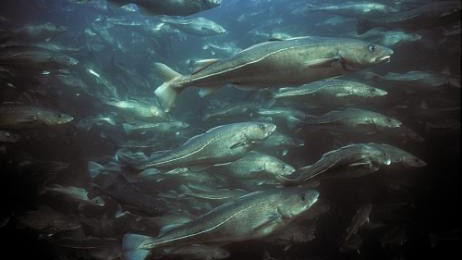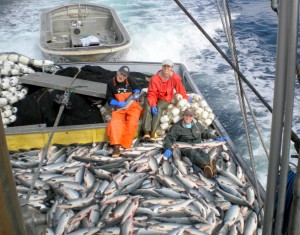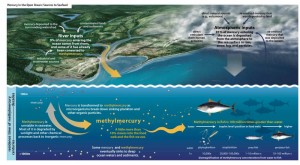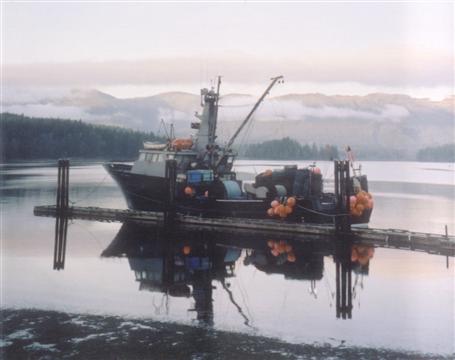
We Can Bring Back Healthy Fish In Historic Abundance Almost Everywhere
This Blue Planet is in a fishery crisis. A solution to restore healthy fish is at hand.
The ocean fish that we have traditionally eaten are dwindling in numbers and many of those remaining are increasingly contaminated with mercury. The wonderful news is that there is a practical, affordable, immediate solution to both problems.
Here’s what happened in our pioneering work in Gulf of Alaska ocean salmon pastures that we replenished and restored to conditions of health and abundance of 100 years ago.
Our global fishery collapse is not as most choose to attribute due to the faults of “the usual suspects” those “bad” over fishers and polluters. While over fishing is indeed a problem it is NOT the principal cause of fishery collapse. Rather the fish have gone missing as a result of a many times more potent issue that of ocean pasture productivity decline.
Oceans of the world are growing less plankton in their ocean pastures. The collapse has reached dire proportions.
Everyone knows a pasture without grass means a pasture without livestock. Walt Whitman once said, “All beef is grass.” The world today supports scores of professions that specifically focus on every aspect of terrestrial pasture stewardship. There are hundreds of colleges that offer degrees in everything about life on terrestrial pasture quite literally from the ground up. Soil sciences, nutrient sciences, hydrology water sciences, soil microbe sciences, root and fungus sciences, grass sciences, legume sciences, weed sciences, shrub sciences, tree sciences, the list goes on and on.
On behalf of the area of this planet that is 70% blue there are almost no specialty sciences save those focused on how to extract wild life from the ocean, nary a one about giving back. No “Aggie Schools” at which the focus in on learned stewardship of the oceans exist. Of marine schools the focus is almost entirely on technology to do with moving faster and deeper and extracting from the oceans, by far the vast majority of their funding comes from sources linked to militaries. Those with the instincts and interests found in farmers and shepherds need not apply. This neglect of the largest and most important part of this blue planets environment must stop and that is what we strive to make a contribution to.
We point out that most assuredly “All fish is plankton.” Without plankton our world of ocean fish have been simply starving to death.
Meanwhile mercury in the oceans is growing to ever more dangerous levels in our fish is due to two synergistic factors. First more and more mercury is pouring into the oceans as a result of our burning more and more coal. But at the same time the oceans natural ability to scrub that deadly mercury was the vibrant plankton of ocean pastures.
As the pastures lose their plankton the oceans natural biofilters and chelators disappear and mercury levels build up. Ocean pasture restoration renews the oceans natural ability to remove poisonous mercury from the ocean and return healthy fish to our tables.
I’ve been working most of 40 years to understand ocean ecology and have been developing technologies and methodologies that will allow us to become caring stewards of our ocean pastures. These method allow us to replenish and restored the ocean pastures affordably and immediately. In doing so we can bring the fish to historic healthy high numbers everywhere. In the summer of 2012 I was able to test my ideas and technologies in the NE Pacific and it worked better than ever imagined.
On the single fishing boat seen here I with 11 shipmates accomplished something wonderful.
Over the course of several weeks we spread a boat load of what amounts to mineral dust, rich in iron, over an ocean eddy about 100km in diameter. The amount of iron in 10,000km2 increased from original levels of 3 parts per trillion to something like 30-100 parts per trillion. The ocean bloomed and life swam to the vibrant ocean pasture and survived and thrived.
Reports are now in of the historic catch of salmon in Alaska and many more are now coming in from up and down the West Coast of N. America. The fish are back in record numbers.
While the fishers of SE Alaska enjoyed the biggest payday ever, they were not the only ones to benefit.
The USDA food aid programs have purchased 60 million servings of our pasture fed Alaska salmon to deliver to hungry America children. We are sure what those kids are saying about our work that is bringing them salmon sandwiches… “yummy.”
We are equally sure that hundreds of millions of hungry children around the world can look forward to meals of healthy fish in the immediate future.
While our work has demonstrated that IT JUST WORKS in the NE Pacific we’ve also been working to discover other locations around the world where our methods and technologies will work equally well. We’ve found many locations where ocean pastures are catastrophically depleted and as a result regional fisheries are a fraction of their historic levels. Surely the practice of most almost every fishery to simply take take take from their ocean pastures and never give back must come to an end. But we have shown that by becoming caring ocean stewards what we need to give back is affordable and immediately effective.
Our next steps are to demonstrate the restoration of ocean pastures will work in all of the world’s seven seas and to bring back billions of healthy nutritious fish to feed an increasingly hungry world. At the same time our replenished and restored ocean pastures will support all forms of ocean life from the tiniest plankton, to fish, seals, birds, and the great whales.
We need your help. Lend a hand by retelling and sharing this story and promise of hope for the oceans, the fish, and our children.




